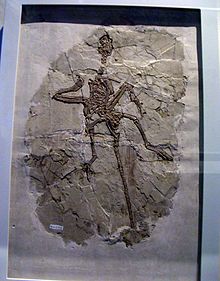| Jixiangornis Temporal range: Early Cretaceous,
| |
|---|---|

| |
| Scientific classification | |
| Domain: | Eukaryota |
| Kingdom: | Animalia |
| Phylum: | Chordata |
| Clade: | Dinosauria |
| Clade: | Saurischia |
| Clade: | Theropoda |
| Clade: | Paraves |
| Clade: | Avialae |
| Genus: | †Jixiangornis Ji et al., 2002 |
| Species: | †J. orientalis
|
| Binomial name | |
| †Jixiangornis orientalis Ji et al., 2002
| |
Jixiangornis is a genus of basal avialan dinosaurs from the Early Cretaceous. Like later avialans, it had no teeth, but it also had a long tail, unlike modern birds. Since teeth were still present in some more derived short-tailed avialans, Jixiangornis seems to have evolved its toothlessness independently of modern birds. The long forelimb (131% of hindlimb length) indicates at least some aerial ability. Jixiangornis is currently known only from a single specimen, a complete but juvenile skeleton. The fossil was found in the Yixian Formation near Beipiao City, western Liaoning, China.
Classification
[edit]The only known species, J. orientalis ("Oriental bird from the Yixian Formation"), was described in November 2002. Ji et al. (2002) considered Jixiangornis capable of stronger flight than either Archaeopteryx or Jeholornis. Their phylogenetic tree shows Jixiangornis forming a clade (called "Euavialae" by Ji et al.) with birds that excludes Archaeopteryx and Jeholornis (=Shenzhouraptor).
An alternative view was presented by Zhou Zong-He and Zhang Fu-Cheng in 2006. They classified both Jixiangornis and Shenzhouraptor as junior synonyms of Jeholornis prima, meaning that Jixiangornis cannot be more advanced than Shenzhouraptor. This approach, however, was problematical given the numerous differences between Jixiangornis and Shenzhouraptor/Jeholornis, and a phylogenetic analysis performed in 2014 found that it may actually be more closely related to short-tailed avialans (Pygostylia) than to Jeholornis, as originally thought.[1]
Hartman et al. (2019), Cau (2020) and Wang et al (2020) found Jixiangornis to have been a jeholornithid but not a synonym of Jeholornis.[2][3][4]
References
[edit]- ^ Lefèvre, U.; Hu, D.; Escuillié, F. O.; Dyke, G.; Godefroit, P. (2014). "A new long-tailed basal bird from the Lower Cretaceous of north-eastern China". Biological Journal of the Linnean Society. 113 (3): 790–804. doi:10.1111/bij.12343.
- ^ Hartman, Scott; Mortimer, Mickey; Wahl, William R.; Lomax, Dean R.; Lippincott, Jessica; Lovelace, David M. (10 July 2019). "A new paravian dinosaur from the Late Jurassic of North America supports a late acquisition of avian flight". PeerJ. 7: e7247. doi:10.7717/peerj.7247. ISSN 2167-8359. PMC 6626525. PMID 31333906.
- ^ Cau, Andrea (25 February 2020). "The body plan of Halszkaraptor escuilliei (Dinosauria, Theropoda) is not a transitional form along the evolution of dromaeosaurid hypercarnivory". PeerJ. 8: e8672. doi:10.7717/peerj.8672. ISSN 2167-8359. PMC 7047864. PMID 32140312.
- ^ Wang, Xuri; Huang, Jiandong; Kundrát, Martin; Cau, Andrea; Liu, Xiaoyu; Wang, Yang; Ju, Shubin (September 2020). "A new jeholornithiform exhibits the earliest appearance of the fused sternum and pelvis in the evolution of avialan dinosaurs". Journal of Asian Earth Sciences. 199: 104401. Bibcode:2020JAESc.19904401W. doi:10.1016/j.jseaes.2020.104401. S2CID 219511931.
Sources
[edit]- Ji, Q; Ji, S.; Zhang, H.; You, H.; Zhang, J.; Wang, L.; Yuan, C.; Ji, X. (2002). "A New Avialian Bird - Jixiangornis orientalis gen. et sp. nov. - from the Lower Cretaceous of Western Liaoning, NE China". Journal of Nanjing University (Natural Sciences). 38 (6): 723–736.
- Zhou, Z.-H. & Zhang, F.-C. (2006): Mesozoic birds of China - A synoptic review. Vertebrata PalAsiatica 44(1): 74–98. PDF fulltext









